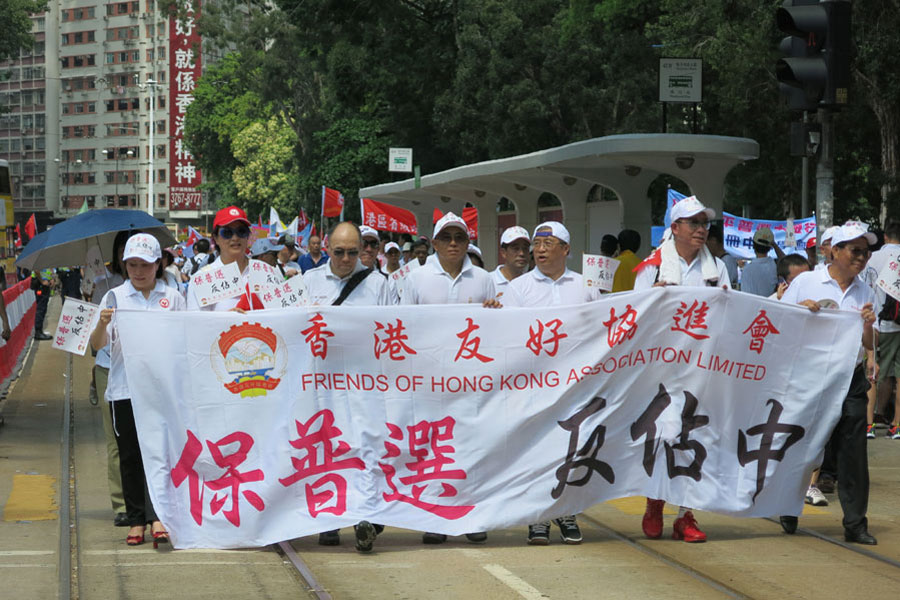Does Occupy Central follow international convention?
- By Mo Jihong
 0 Comment(s)
0 Comment(s) Print
Print E-mail China.org.cn, August 27, 2014
E-mail China.org.cn, August 27, 2014
|
|
|
People participate in a march against the Occupy Central campaign in south China's Hong Kong, Aug 17, 2014. Hong Kong's Alliance for Peace and Democracy organized a march on Sunday against the Occupy Central campaign, with more than 120,000 people in Hong Kong signed up to join. [Photo/cri.cn] |
How the Chief Executive election in Hong Kong will be carried out in 2017 will be decided on Aug. 31, when the Standing Committee of the National People's Congress (NPC), China's top legislature, is due to announce its final decision, an occasion that many analysts have called a "showdown."
Radical opposition activists said on Aug. 22 that Occupy Central would be "inevitable," if the NPC Standing Committee requires a Chief Executive candidate to have at least half of the votes from a nomination committee. The Hong Kong opposition's move was regarded as continuous pressure on China's central authorities.
Among those who joined in Occupy Central, some claimed their campaign has complied with the international convention of practicing "civil disobedience" even though it might be "illegal."
But their acts amount to distorting international conventions while they claim compliance with them. If Occupy Central is regarded as an expression of freedom, there are indeed a handful of international conventions to follow.
The International Covenant on Civil and Political Rights (ICCPR), which entered into force in 1976, is such framework. Article 19, on Defending Freedom of Expression and Information, confirms that individuals enjoy right of expression, but the exercise of the right "carries with it special duties and responsibilities," and it may therefore be "subject to certain restrictions, such as are provided by law and are necessary."
In the broad sense, Occupy Central was intended to protect citizens' freedom of expression, but in practice, their method of expression has to abide by the law. In other words, their claim of rights has to be supported by law for it to be reasonable.
Currently, in Hong Kong, some people think they are destined to practice "civil disobedience" even at the cost of breaking the law. But once Occupy Central takes place, Hong Kong's public interest will be inevitably undermined; hence, what the protestors claimed as a "non-violent" campaign did exceed what could be recognized as a "rational expression."
The European Convention on Human Rights, which has similar international influence, stipulates in its Article 10 that "the exercise of these freedoms" "may be subject to such formalities, conditions, restrictions or penalties as are prescribed by law and are necessary in a democratic society…." This amounts to another clear message that the expression of freedom has to be exercised in a way approved by law.
The hardliners in the opposition are determined to "carry on Occupy Central until the end," while seeking theoretical support from international conventions. Little did they realize that their acts were no longer exercising freedom of expression, but amount to preparing a revolution.
Their incitement will only lead to chaos in Hong Kong society. Any Chinese with a sense of justice cannot and should not be blinded by such illegitimate acts.
Neither the central Chinese Government nor the Special Administration Region (SAR) government will allow such acts to develop uncontrolled and affect the stability and development of Hong Kong.
Based on this notion, those protestors who cite these conventions should reconsider whether their Occupy Central campaign is justifiable in terms of legal principles or international practice. If they continue such reckless acts, their attempt to gain public support by playing the victims will only amount to "throwing good money after bad things."
The writer is a research fellow at the Institute of Law Studies at the Chinese Academy of Social Sciences.
The article was translated by Chen Boyuan. Its original version was published in Chinese.
Opinion articles reflect the views of their authors, not necessarily those of China.org.cn.







Go to Forum >>0 Comment(s)